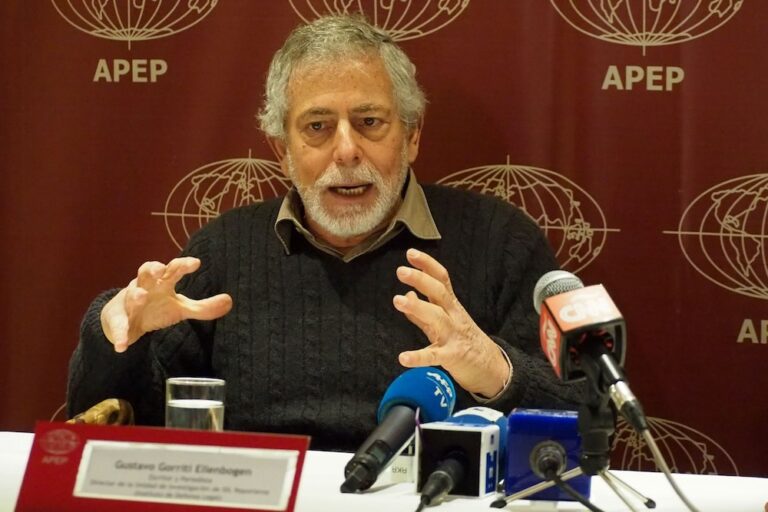(IPYS/IFEX) – On 4 August 1999, an official decree annulling resolution No. 236-99-RE, signed by President Alberto Fujimori and Minister of External Affairs Fernando de Trazegnies, was published in the government newspaper “El Peruano”. The previous resolution had named the individuals appointed to represent the government to the Inter American Human Rights Commission (CIDH) in […]
(IPYS/IFEX) – On 4 August 1999, an official decree annulling resolution No.
236-99-RE, signed by President Alberto Fujimori and Minister of External
Affairs Fernando de Trazegnies, was published in the government newspaper
“El Peruano”. The previous resolution had named the individuals appointed to
represent the government to the Inter American Human Rights Commission
(CIDH) in relation to the Baruch Ivcher case.
**Updates IFEX alerts of 16 July, 14 July, 11 June, 7 June, 2 June, 28 May,
21 May, 17 May, 20 April and 8 April 1999 and 2 December 1998**
The decree was the result of an official letter sent by Minister of Justice
Jorge Bustamante to the Minister of External Affairs informing him of the
decision to withdraw from the Ivcher case currently being examined by the
CIDH. Ivcher, formerly the major shareholder of the television station
“Frequencia Latina”, was stripped of his Peruvian citizenship and of the
right to manage the television station.
Official decree No. 336-99-RE withdraws the government’s lawyers, Mario
Cavagnaro Basile, the public attorney of the State Judicial Defence Council,
and Sergio Tapia Tapia, a consultant to the Ministry of Justice, from the
case initiated by the Inter American Human Rights Court in response to the
motion put forth by the CIDH. The two lawyers were to have acted as
governmental representative and alternate representative, respectively.
The representatives’ withdrawal follows a 7 July congressional decision
withdrawing Peru from the legal battle with the Inter American Human Rights
Court, effective immediately.
Speaking to local media in Israel, Ivcher emphasised that he would continue
to defend his case before the Inter American Court. He noted that the
Ministry of External Affairs’ action demonstrates to the world that the
Peruvian government is abandoning a legal battle out of fear of what will be
revealed by the CIDH’s motion.
Ivcher further noted that another reason for the government’s withdrawal
from the case is that the following individuals were included among the
thirty-six witnesses who had been called to testify: the former commander
general of the Armed Forces, Nicolás de Bari Hermoza Ríos, the advisor to
the National Intelligence Service (SIN), Vladimiro Montesinos Torres,
General Enrique Olveros Pérez, Judge Percy Escobar and Police Commander
Pedro Carbajal. According to Ivcher, President Fujimori and his allies are
frightened of being interrogated because this would expose “the true face of
this government.”
Diego García Sayán, the executive director of the Andean Legal Commission
(Comision Andina de Juristas), agrees that the government’s withdrawal from
the case was motivated by the regime’s desire to “prevent cases, like that
of Ichver and the Constitutional Tribunal (some members of which were
dismissed for having opposed Fujimori’s re-election), to be resolved by the
Inter American Court.”
García Sayán suspects that, given that this partial withdrawal is legally
unsubstantiated, the court will likely proceed with the already initiated
cases. He noted that, by annuling their representatives’ appointment, the
regime’s intention is to send a message to the judge that the case between
Ivcher and the government will not continue.
García Sayán explained that this message does not make sense, nor is it
legally valid, because not only is it inappropriate to partially withdraw
from a case before the court but, furthermore, the Peruvian government had
already begun participating in the legal proceedings by having named its
defense lawyers.
Background Information
Ivcher, who is originally from Israel, was stripped of his Peruvian
citizenship and consequently of his right to manage the television station,
as a result of his reporting on serious accusations of state corruption, the
torture of military intelligence agents, and telephone espionage that
opposition politicians and independent journalists were subject to.


